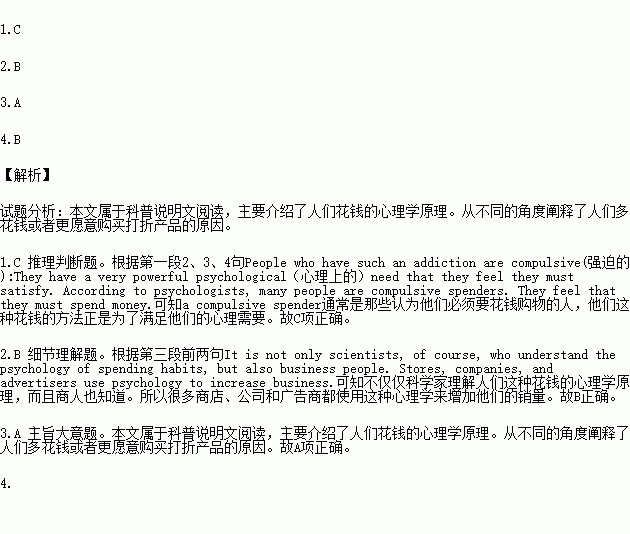题目内容
People can be addicted to(沉溺于) different things — e.g. alcohol, drug, certain foods, or even television. People who have such an addiction are compulsive(强迫的):They have a very powerful psychological(心理上的)need that they feel they must satisfy. According to psychologists, many people are compulsive spenders. They feel that they must spend money. This compulsion, like most others, is impossible to explain reasonably. For compulsive spenders who buy on credit(以赊欠方式), charge accounts are even more exciting than money. In other words, compulsive spenders feel that with credit, they can do anything. Their pleasure in spending large amounts is actually greater than the pleasure that they get from the things they buy.
There is even a special psychology of bargain hunting. To save money, of course, most people look for sales, low prices, and discounts. Compulsive bargain hunters, however, often buy things that they don’t need just because they are cheap. They want to believe that they are helping their budgets(预算), but they are really playing an exciting game. When they can buy something for less than other people, they feel that they are winning. Most people, experts claim, have two reasons for their behavior: a good reason for the things that they do and the real reason.
It is not only scientists, of course, who understand the psychology of spending habits, but also business people. Stores, companies, and advertisers use psychology to increase business. They consider people’s needs for love, power, or influence, their basic values, their beliefs and opinions, and so on in their advertising and sales methods. Psychologists often use a method called “behavior therapy(疗法)” to help individuals solve their personality problems. In the same way, they can help people who feel that they have problems with money.
1.According to the psychologists, a compulsive spender is one who spends large amounts of money___.
A. and takes great pleasure from what he or she buys
B. in order to satisfy his or her basic needs in life
C. just to meet his or her strong psychological need
D. and feels he or she is cheated
2.Which of the following statements is TRUE according to the text?
A. People spend money for exactly the same reason that they need to buy things.
B. Business people and advertisers can use the psychology of people’s spending habits to increase sales.
C. Business people understand the psychology of compulsive buying better than scientists do.
D. Compulsive bargain hunters do not have problems with money.
3.What is the text mainly about?
A. The psychology of money-spending habits.
B. The habits of compulsive spenders.
C. A special psychology of bargain hunting.
D. The use of the psychology of spending habits in business.
4.From the text we may safely conclude that compulsive spenders or compulsive bargain hunters _____.
A. are really unreasonable
B. need special treatment
C. are really beyond drugs
D. can never get any help to solve their problems with money
 名校课堂系列答案
名校课堂系列答案
